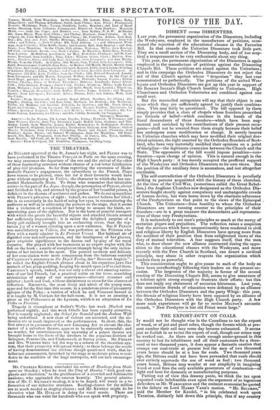TOPICS OF THE DAY.
DISSENT versus DISSENTERS.
LAST year, the permanent organization of the Dissenters, including the Wesleyans, employed in the manufacture of petitions, occa- sioned the rejection of the educational clauses in the Factories Bill. In that crusade the Unitarian Dissenters took little part. They are a small section of the Dissenting body, and of too scep- tical a temperament to be very enthusiastic about any thing. This year, the permanent organization of the Dissenters is again employed in the manufacture of petitions against the Dissenting Chapels Bill. These petitions are aimed against the Unitarians ; and in this campaign the Orthodox Dissenters do not reject the aid of that Church against whose " despotism " they last year remonstrated so pathetically. The petitions of the united Wes- leyans and Orthodox Dissenters are got up this year in support of Sir ROBERT INGLIS'S High Church hostility to Unitarians. High Churchmen and Orthodox Voluntaries are combined against one small sect.
But the reconciled antagonists will say that their object is one upon which they are sufficiently agreed to justify their combine. tion. This may fairly be questioned. The bill opposed by them simply provides that a class of chapels whose founders prescribed no formula of belief—which continue in the hands of the lineal descendants of these founders—which have been aug- mented and enriched by the contributions of their present occu- pants—shall not be wrested from them simply because their belief has undergone some modification or change. It merely insures to Unitarian churches which may have modified their original doc- trinal opinions, the right asserted by the Orthodox Seceders of Scot- land, who have very materially modified their opinions on a point of discipline—the legitimate connexion between the Church and the State. The opponents of the bill would impose penalties—con- fiscation—upon change of opinion. This is natural enough in the High Church party : it has merely accepted the proffered support of the Wesleyans and Orthodox Dissenters to its own views. But the position of the auxiliary force is anomalous, and not altogether creditable.
The self-contradiction of the Orthodox Dissenters is peculiarly striking to persons acquainted with the history of these churches. At the time of the Civil War, (sometimes called the Great Rebel- lion,) the Anglican Churches now designated as the Orthodox Dis- senters fought stoutly against compulsory and unchangeable creeds of human device, but were borne down by the obstinate adherence of the Presbyterians on that point to the views of the Episcopal , Church. The Unitarians—from hostility to whom the Orthodox Dissenters are now running counter to the principles of their founders—are in a great measure the descendants and representa- tives of those very Presbyterians.
It is melancholy to see men's principles so much at the mercy of sectarian piques and prejudices. The reflection raises a suspicion that the services which have unquestionably been rendered to civil and religious liberty by English Dissenters have sprung more from the accident of their position than from enlightened views of the duty of mutual toleration. A fear suggests itself, that the men who, to draw closer the new alliance contracted during the oppo- sition to the educational clauses with the Wesleyans, and more recently with the Free Church in Scotland, can desert a cardinal principle, may abuse in other respects the organization which renders them so powerful.
This consideration ought to give pause to such of the body as have been unreflectingly following their leaders on the present oc- casion. The largeness of the majority in favour of the second reading of the Dissenting Chapels Bill, seems to give assurance of a tolerant spirit strong enough to frustrate their efforts : but this does not imply any abatement of sectarian bitterness. Last year, the unsectarian friends of education were defeated by an alliance between the Orthodox Dissenters and the party Whigs: this year, the friends of religious liberty have been opposed by an alliance of the Orthodox Dissenters with the High Church party. A few more such experiences will go far to revive MILTON'S sarcastic remark, " New Presbyter is but old Priest wrote large."


























 Previous page
Previous page